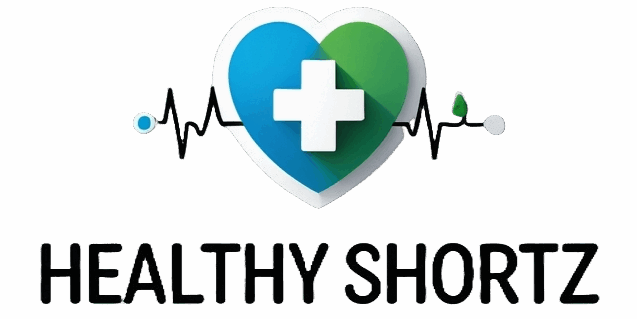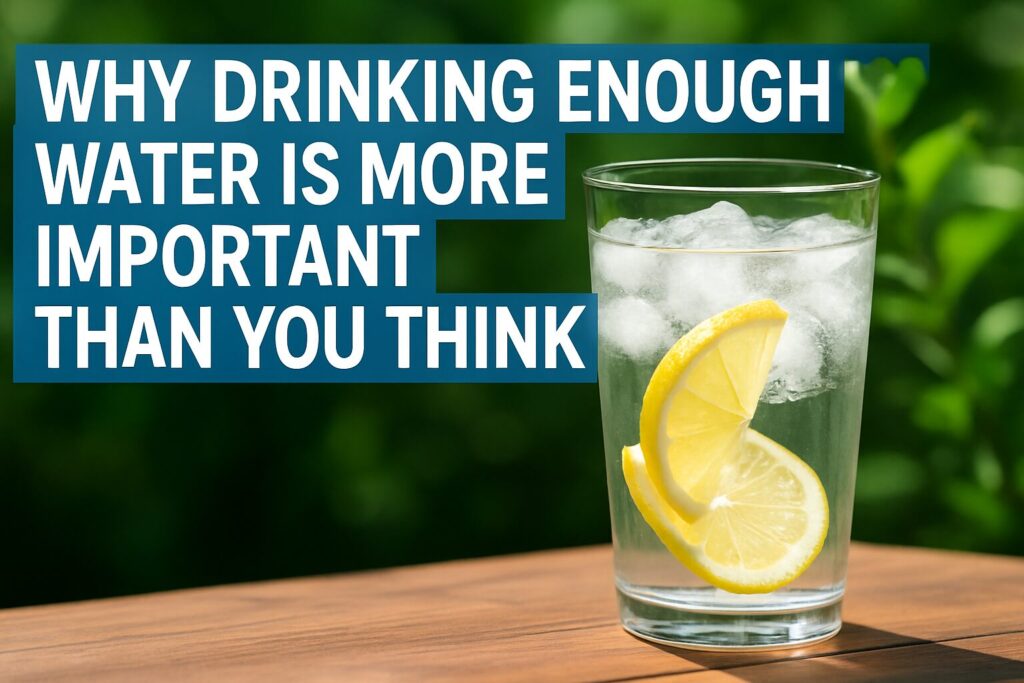Discover why drinking enough water daily is essential for health. Learn the benefits of hydration for energy, skin, digestion, brain function, immunity, and more plus practical tips to stay hydrated every day.
Table of Contents
Introduction
Water is often overlooked as a simple beverage, but it is one of the most essential nutrients for human survival. Around 60% of the human body is made up of water, and every organ, cell, and tissue relies on it to function properly. Yet, many people underestimate the importance of drinking enough water daily, leading to dehydration and a decline in overall health.
From boosting energy to improving skin health and even supporting brain function, water plays a role in nearly every bodily process. Unlike many diet fads or wellness trends, hydration is backed by decades of medical research and remains one of the simplest, most cost-effective ways to maintain good health.
In this article, we’ll explore why drinking water daily is more important than most people realize, uncover the hidden benefits of proper hydration, and provide practical tips to help you stay on track.
The Role of Water in the Human Body: Why Hydration Matters
Water is not just a thirst quencher, it’s the foundation of life. Every organ and biological process in the body depends on it. Without adequate hydration, even simple functions like thinking, moving, or digesting food can be disrupted.
Here’s why water is so vital to the human body:
- Cellular Function: Every cell in the body requires water to transport nutrients in and flush waste out.
- Temperature Regulation: Sweating and evaporation help the body cool down, preventing overheating.
- Joint Lubrication: Water forms part of the synovial fluid that cushions joints, reducing friction and stiffness.
- Nutrient Absorption: It dissolves vitamins and minerals, making them available for absorption in the intestines.
- Circulation: Blood, which carries oxygen and nutrients throughout the body, is more than 90% water.
According to the World Health Organization (WHO), proper hydration supports normal physical and cognitive performance, particularly in hot climates or during exercise. Even mild dehydration can negatively impact mood, concentration, and energy.
In short, drinking enough water daily is not optional, it is a biological necessity that keeps every system of the body running efficiently.
Signs of Dehydration You Should Never Ignore
Dehydration happens when the body loses more water than it takes in, and even mild levels can have serious effects. Many people don’t recognize the early warning signs, mistaking them for tiredness or stress. Understanding these signals is key to preventing health problems.
Common signs of dehydration include:
- Thirst and Dry Mouth – The most obvious sign, but often ignored until dehydration worsens.
- Dark Yellow Urine – Healthy hydration usually produces light-colored urine. Dark urine may indicate the body needs more water.
- Fatigue and Low Energy – Without water, cells cannot produce energy efficiently, leaving you tired.
- Headaches and Dizziness – A lack of fluids reduces blood volume and oxygen flow to the brain.
- Dry Skin – Dehydration can cause the skin to lose elasticity and appear flaky.
- Poor Concentration – Research suggests that dehydration as mild as 1–2% of body weight can affect focus and memory (Source: National Institutes of Health).
Severe dehydration can lead to rapid heartbeat, sunken eyes, confusion, and in extreme cases, organ failure. Children, older adults, and athletes are at higher risk because their bodies may not regulate fluids as effectively.
Recognizing these symptoms early and responding with drinking enough water daily can prevent complications and keep the body functioning at its best.
Health Benefits of Drinking Enough Water Daily
Staying properly hydrated is one of the simplest ways to protect long-term health. Beyond just quenching thirst, drinking enough water daily supports the body in countless ways. Here are some of the most important benefits:
- Supports Heart Health
Water helps maintain healthy blood volume and circulation. Proper hydration reduces strain on the heart and lowers the risk of high blood pressure. - Boosts Physical Performance
During exercise, dehydration can lead to fatigue, muscle cramps, and overheating. Drinking water helps regulate body temperature and prevents performance decline. - Promotes Healthy Skin
While water isn’t a magic cure for wrinkles, adequate hydration keeps skin plump, elastic, and less prone to dryness. - Aids Detoxification
The kidneys rely on water to flush out toxins through urine. Without enough fluids, waste products can build up in the body. - Improves Digestion
Water is essential for breaking down food and moving nutrients through the digestive tract. It also helps prevent constipation. - Supports Weight Management
Studies show that drinking water before meals may promote a feeling of fullness, reducing calorie intake (Source: PubMed). - Enhances Brain Function
Even mild dehydration can impair concentration, alertness, and short-term memory.
In short, water plays a role in nearly every system from heart and brain health to digestion and metabolism. Making hydration a daily priority ensures your body performs at its best.
The Link Between Water and Energy Levels
Many people reach for coffee or energy drinks when they feel tired, but often the real issue is dehydration. Water is essential for cellular energy production, and without it, the body struggles to maintain stamina.
Here’s how drinking enough water daily affects energy:
- Supports Oxygen Transport – Water helps blood carry oxygen throughout the body. Low hydration reduces circulation, leading to sluggishness and fatigue.
- Optimizes Metabolism – Dehydration slows down the body’s ability to convert food into usable energy.
- Reduces Fatigue in Muscles – Muscles are about 75% water. When dehydrated, they become more prone to cramps and weakness.
- Improves Focus and Alertness – Studies show that even mild dehydration can lower concentration and mood, making you feel mentally drained (Source: Journal of Nutrition).
A good example is athletes: those who fail to rehydrate during training often report feeling exhausted faster than those who keep fluids in balance. But even outside sports, people who drink enough water daily tend to experience steadier energy throughout the day.
In short, hydration is one of the cheapest, healthiest, and most effective natural energy boosters available.
Hydration and Skin Health: Does Drinking Water Make You Glow?
Many skincare routines focus on creams, serums, and treatments, but true skin health starts from within. Since the skin is the body’s largest organ, it depends heavily on hydration to function and look its best.
Here’s how drinking enough water daily benefits your skin:
- Improves Elasticity – Hydrated skin is more supple and less prone to fine lines and sagging.
- Prevents Dryness – Adequate water intake helps maintain the skin’s natural moisture balance.
- Reduces Puffiness – Proper hydration supports circulation and helps flush out excess salt, reducing bloating around the eyes and face.
- Supports Healing – Water helps transport nutrients to skin cells, aiding faster recovery from wounds or sunburn.
It’s important to note that drinking water alone won’t erase wrinkles or replace a balanced skincare routine. However, research suggests that hydration improves skin thickness and blood flow, which can enhance overall appearance (Source: Clinical, Cosmetic and Investigational Dermatology).
Think of water as your skin’s silent partner: while topical products work on the outside, hydration keeps your skin nourished from within.
How Water Supports Digestion and Weight Loss
Water does far more than just quench thirst it plays a vital role in how your body digests food and maintains a healthy weight. Without enough fluids, the digestive system struggles to function efficiently.
Water and Digestion
- Aids in Food Breakdown – Water helps dissolve nutrients and enzymes, making it easier for the body to absorb vitamins and minerals.
- Prevents Constipation – Adequate hydration keeps stool soft, allowing for smoother bowel movements.
- Supports Stomach Lining – Water helps maintain the protective mucosal lining of the stomach, reducing the risk of irritation from stomach acid.
Water and Weight Loss
- Reduces Appetite – Drinking water before meals can create a sense of fullness, lowering calorie intake. A study found that people who drank water before meals lost more weight than those who didn’t (Source: PubMed).
- Boosts Metabolism – Some research suggests that drinking cold water can slightly increase calorie burning as the body works to warm it up.
- Replaces High-Calorie Drinks – Swapping sugary sodas or juices with plain water significantly cuts down on empty calories.
In essence, drinking enough water daily supports a smoother digestive process while offering a natural aid to weight management. It’s not a magic solution for weight loss, but when combined with a balanced diet and exercise, it’s a powerful ally.
The Impact of Hydration on Brain Function and Mental Clarity
The brain is about 75% water, which makes hydration critical for mental performance. Even mild dehydration can affect mood, memory, and focus more than many people realize.
How Drinking Enough Water Daily Helps the Brain
- Boosts Concentration – Studies show that dehydration as little as 1–2% of body weight can impair attention and short-term memory (Source: National Library of Medicine).
- Stabilizes Mood – Lack of water has been linked to increased irritability, anxiety, and fatigue.
- Supports Cognitive Function – Proper hydration ensures efficient communication between brain cells, helping with problem-solving and alertness.
- Prevents Headaches – One of the most common dehydration symptoms is headache, often mistaken for stress or lack of sleep.
Real-World Example
Think of a student preparing for exams or a professional working long hours. Without proper hydration, they may struggle to concentrate, forget details, or feel mentally drained. A simple glass of water could help restore clarity and energy.
In short, water acts like fuel for the brain. Staying hydrated ensures your mind remains sharp, focused, and ready to perform at its best.
Water vs. Other Beverages: What’s Best for Your Health?
While coffee, tea, juice, and soft drinks can contribute to fluid intake, nothing replaces the benefits of drinking enough water daily. Unlike other beverages, water hydrates the body without added sugars, caffeine, or unnecessary calories.
Why Water Is Superior
- Zero Calories – Unlike soda or juice, water hydrates without contributing to weight gain.
- No Added Sugar – Excess sugar from drinks is a major cause of obesity, diabetes, and dental problems.
- Better for Kidneys – Water helps flush waste efficiently, while sugary drinks increase the risk of kidney stones.
Other Beverages: Pros and Cons
- Coffee & Tea – Contain antioxidants and can be healthy in moderation, but excess caffeine may cause dehydration or sleep issues.
- Fruit Juice – Provides vitamins but also large amounts of sugar. Whole fruits are a better option.
- Sports Drinks – Useful for athletes needing electrolytes, but unnecessary for most people.
- Soft Drinks & Energy Drinks – Often high in sugar, caffeine, and artificial ingredients; best avoided.
According to the Centers for Disease Control and Prevention (CDC), replacing sugary beverages with plain water reduces daily calorie intake and improves long-term health outcomes.
Bottom line: While other drinks may have their place, water remains the healthiest, most reliable way to stay hydrated every day.
Practical Tips to Stay Hydrated Throughout the Day
Knowing the benefits of hydration is one thing, but making it a daily habit is another. Many people simply forget to drink enough water daily, especially with busy schedules. The good news? With small adjustments, staying hydrated can become effortless.
Simple Ways to Boost Daily Hydration
- Start Your Morning with Water – Drink a glass of water as soon as you wake up to rehydrate after hours of sleep.
- Carry a Reusable Bottle – Having water on hand makes it easier to sip throughout the day.
- Set Reminders – Use a phone app or alarms to remind yourself to drink water regularly.
- Flavor It Naturally – Add slices of lemon, cucumber, or berries for a refreshing twist without added sugar.
- Eat Water-Rich Foods – Fruits like watermelon, oranges, and cucumber contribute to fluid intake.
- Follow the “8×8 Rule” – A common guideline is eight 8-ounce glasses (about 2 liters) daily, though exact needs vary by age, activity, and climate.
- Drink Before You Feel Thirsty – Thirst is already a sign of dehydration; sip water consistently throughout the day.
Pro Tip for Busy People
Pair your water breaks with existing habits for example, drink a glass before every meal or after every bathroom break. Over time, it becomes second nature.
By adopting these small habits, you can ensure hydration doesn’t just stay an intention, but becomes part of your lifestyle.
Myths and Facts About Drinking Water
Hydration is often surrounded by misconceptions that can confuse people. Let’s separate fact from fiction so you can make smarter choices about drinking enough water daily.
Common Myths vs. Reality
- Myth: Everyone needs exactly 8 glasses a day.
Fact: The “8×8 rule” is a helpful guideline, but hydration needs vary depending on age, weight, climate, and activity level. Some may need more, others less. - Myth: Thirst is the best indicator of hydration.
Fact: By the time you feel thirsty, you’re already mildly dehydrated. Monitoring urine color (light yellow is ideal) is a better indicator. - Myth: Coffee and tea dehydrate you.
Fact: While caffeine is mildly diuretic, moderate coffee or tea still contributes to overall hydration. - Myth: Drinking lots of water quickly is best.
Fact: Overhydration can lead to a condition called hyponatremia (dangerously low sodium levels). It’s healthier to sip water steadily throughout the day. - Myth: Cold water burns more calories.
Fact: While your body expends small energy warming cold water, the calorie difference is minimal and not a weight-loss strategy.
The Takeaway
Hydration is about balance, not extremes. The goal isn’t to overdrink but to consistently meet your body’s needs. Focusing on drinking water daily in moderation is the safest and most effective approach.
Why Proper Hydration Is Crucial for Athletes and Active People
For athletes, fitness enthusiasts, and anyone with an active lifestyle, drinking enough water daily isn’t just important, it’s essential for performance and recovery. Physical activity increases fluid loss through sweat and breathing, making hydration a key factor in endurance and safety.
Why Hydration Matters During Exercise
- Temperature Control – Sweating helps cool the body, but without enough fluids, overheating and heat exhaustion can occur.
- Maintains Strength and Stamina – Even a 2% loss of body fluids can reduce athletic performance, leading to fatigue and slower reaction times (Source: American College of Sports Medicine).
- Supports Muscle Function – Muscles rely on water to contract efficiently. Dehydration increases the risk of cramps and injury.
- Faster Recovery – Water helps flush out lactic acid and deliver nutrients needed to repair muscle tissue after workouts.
Special Considerations for Athletes
- Electrolytes – During intense or prolonged exercise, the body loses sodium and potassium through sweat. In these cases, water plus electrolyte-rich drinks may be needed.
- Timing Matters – Experts recommend drinking water before, during, and after exercise, not just waiting until thirst sets in.
- Personalized Hydration – Active individuals should monitor sweat loss and urine color to tailor fluid intake to their body’s needs.
For anyone who trains regularly, staying hydrated isn’t just about comfort, it’s about safety, endurance, and maximizing performance.
The Connection Between Water and Kidney Health
The kidneys are the body’s natural filtration system, and they rely heavily on water to function properly. Without adequate hydration, they struggle to remove waste and toxins from the bloodstream. Over time, this can lead to serious health issues.
How Drinking Enough Water Daily Supports Kidney Health
- Flushes Out Toxins – Water helps kidneys remove urea and other waste products efficiently through urine.
- Prevents Kidney Stones – Staying hydrated dilutes minerals and salts in urine, lowering the risk of stone formation (Source: National Kidney Foundation).
- Reduces Risk of UTIs – Adequate hydration increases urination frequency, flushing bacteria out of the urinary tract.
- Supports Blood Pressure Control – Kidneys help regulate blood pressure, and proper hydration keeps this balance stable.
What Happens When You Don’t Drink Enough Water
Chronic dehydration can put excess strain on the kidneys, increasing the risk of:
- Kidney stones
- Urinary tract infections (UTIs)
- Reduced kidney function over time
The Bottom Line
For long-term kidney health, nothing is more important than consistent hydration. Simply drinking enough water daily can significantly reduce your risk of kidney-related problems.
Can Drinking Water Boost Your Immune System?
A strong immune system depends on many factors such as nutrition, sleep, and exercise and hydration plays a vital supporting role. While water itself doesn’t “fight off infections,” drinking enough water daily helps the immune system work efficiently.
How Water Supports Immunity
- Transports Nutrients – Water carries vitamins, minerals, and oxygen to cells that defend against illness.
- Flushes Out Toxins – Adequate hydration helps the kidneys and liver remove waste, preventing toxin buildup that may weaken immunity.
- Keeps Mucous Membranes Moist – Hydration maintains protective barriers in the nose, mouth, and throat, which are the body’s first line of defense against pathogens.
- Supports Lymphatic System – The lymphatic system, which circulates infection-fighting white blood cells, relies on water to function smoothly.
Research Insight
According to the Journal of Human Nutrition and Dietetics, dehydration can impair physical performance and immune response, making the body more vulnerable to infections.
Practical Takeaway
While water alone won’t prevent illness, it ensures the body’s natural defense systems are well-supported. Combined with good nutrition, rest, and hygiene, drinking water daily is one of the easiest ways to keep your immune system strong.
Final Thoughts: Making Hydration a Daily Priority
Water is more than just a drink, it’s a lifeline for every part of the body. From boosting energy and aiding digestion to supporting kidney health and brain function, the everyday benefits of drinking enough water daily are undeniable. Yet, many people still fall short of their hydration needs.
The good news? Staying hydrated doesn’t require expensive supplements or complicated routines. It simply means making water a consistent part of your daily life. Carry a bottle with you, choose water over sugary drinks, and pay attention to your body’s signals. Small habits like these can make a big difference in your long-term health.
In a world full of health advice and wellness trends, water remains the simplest, most accessible, and most powerful tool we have for better living. By prioritizing hydration, you’re not just quenching thirst you’re fueling your body, protecting your organs, and setting yourself up for a healthier future.
So the next time you’re tempted to skip that glass of water, remember: it’s more important than you think.



